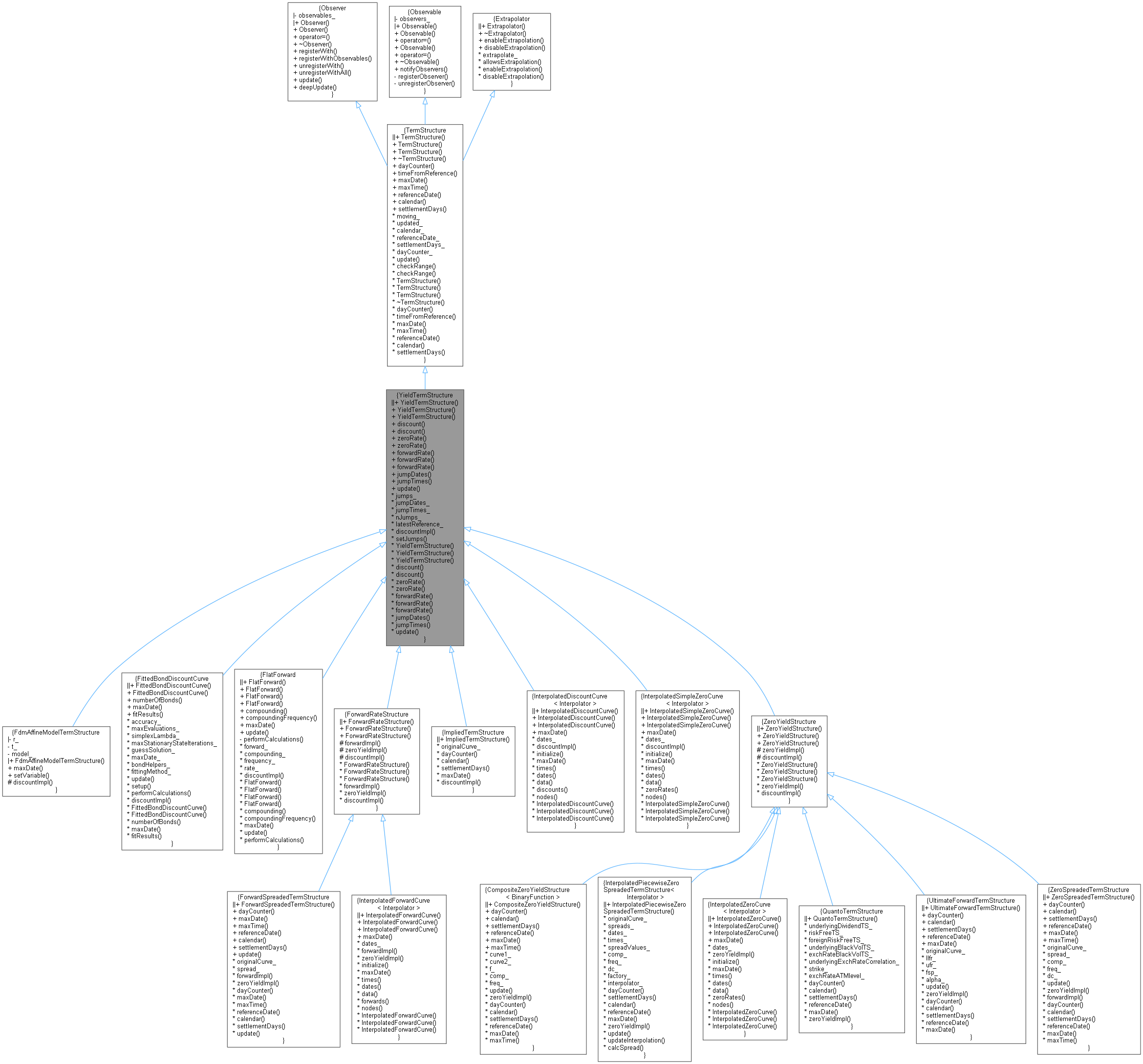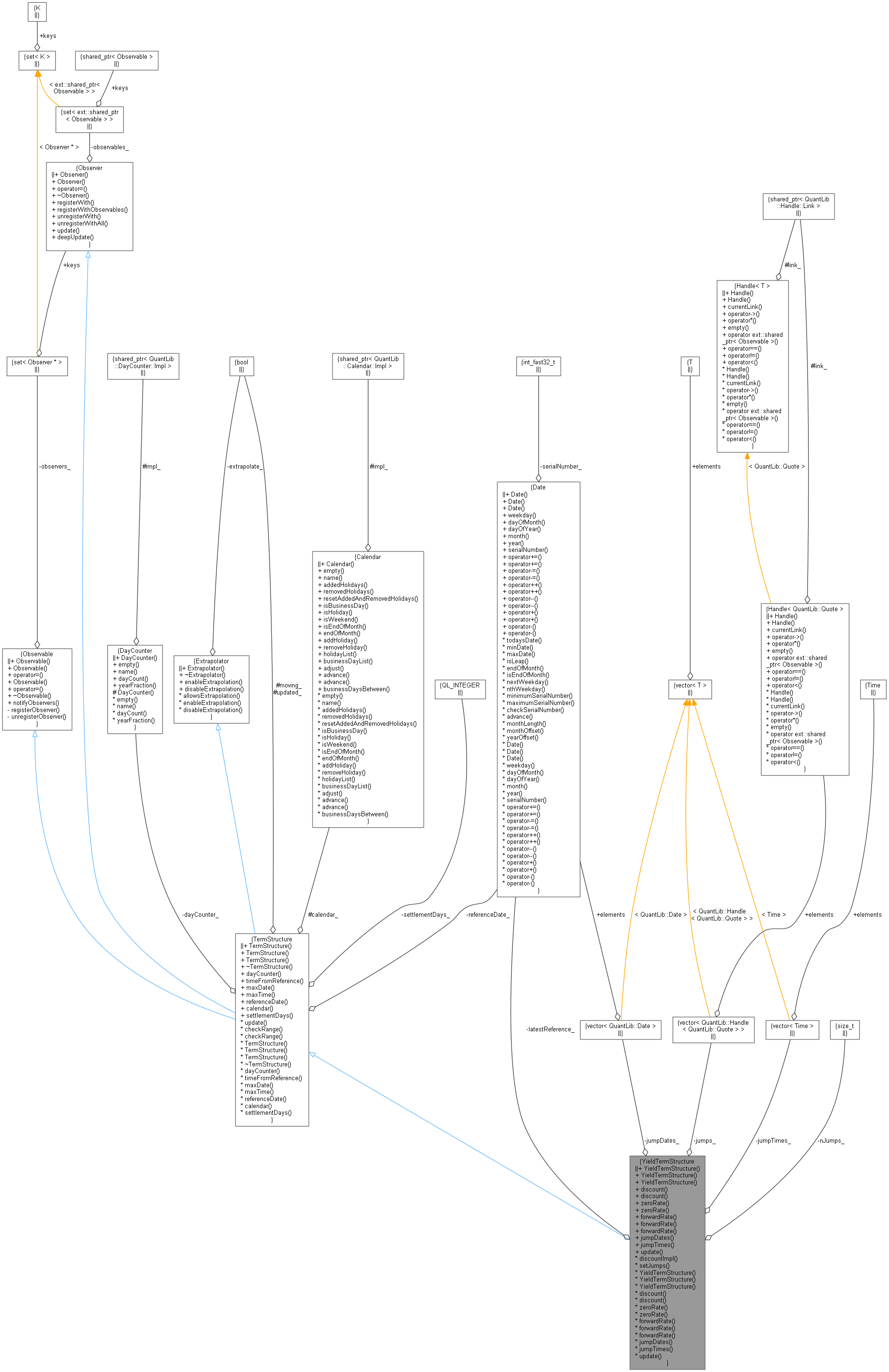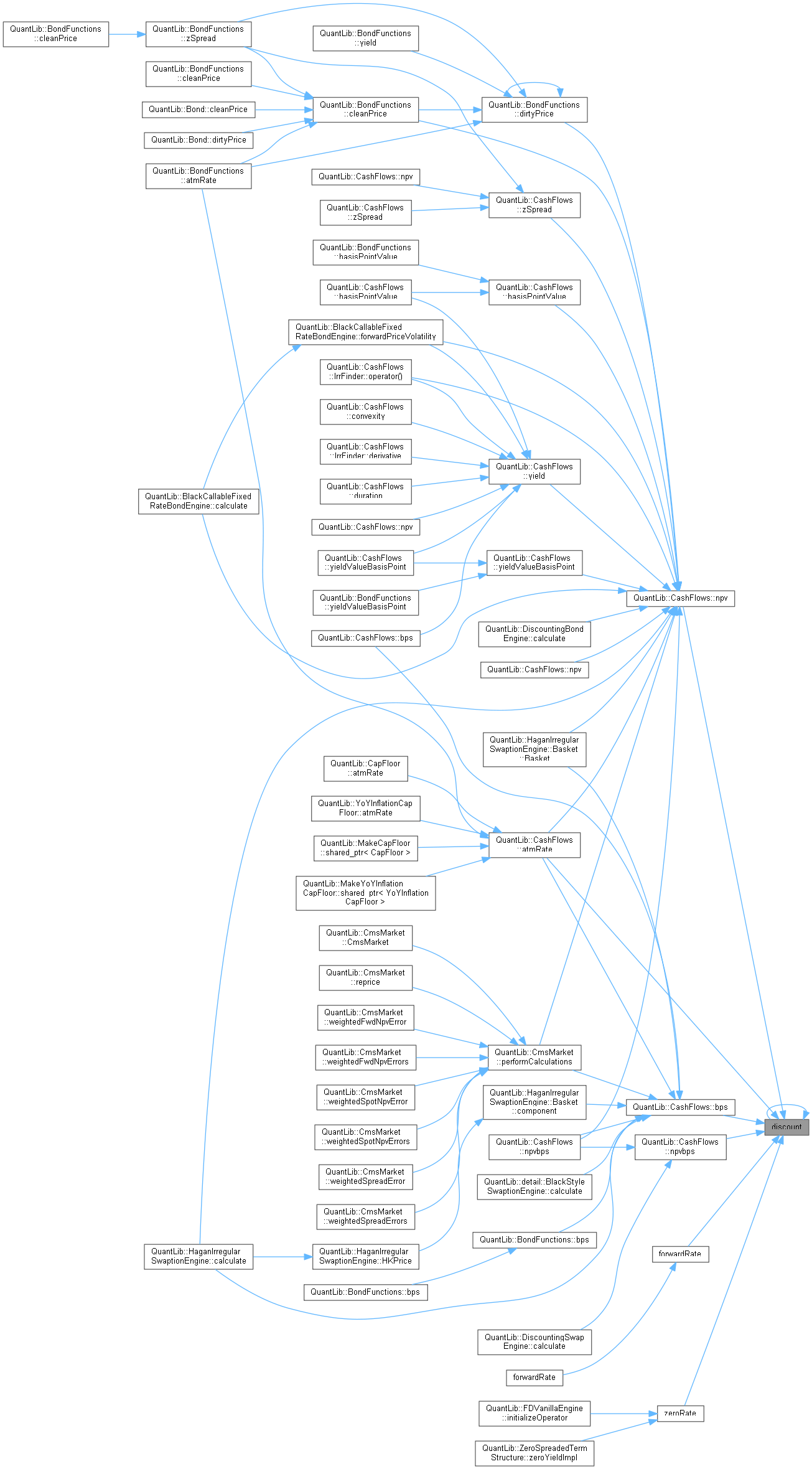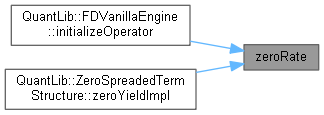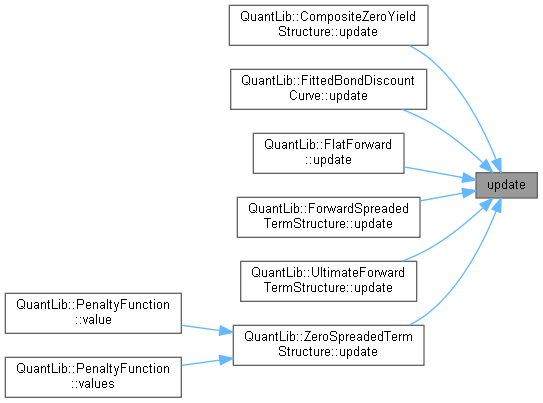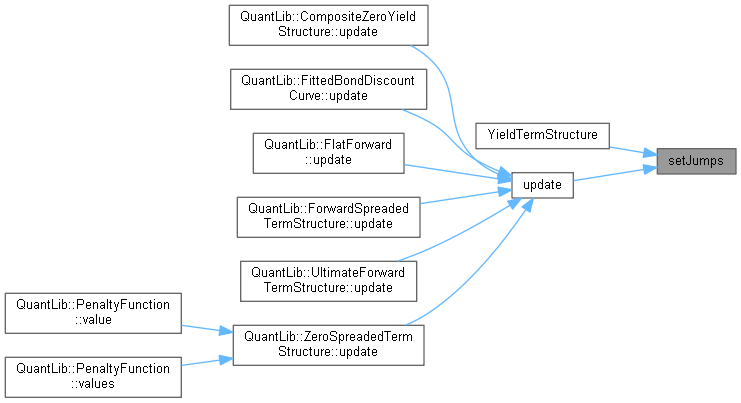Interest-rate term structure. More...
#include <yieldtermstructure.hpp>
 Inheritance diagram for YieldTermStructure:
Inheritance diagram for YieldTermStructure: Collaboration diagram for YieldTermStructure:
Collaboration diagram for YieldTermStructure:Public Member Functions | |
Constructors | |
See the TermStructure documentation for issues regarding constructors. | |
| YieldTermStructure (const DayCounter &dc=DayCounter()) | |
| YieldTermStructure (const Date &referenceDate, const Calendar &cal=Calendar(), const DayCounter &dc=DayCounter(), std::vector< Handle< Quote > > jumps={}, const std::vector< Date > &jumpDates={}) | |
| YieldTermStructure (Natural settlementDays, const Calendar &cal, const DayCounter &dc=DayCounter(), std::vector< Handle< Quote > > jumps={}, const std::vector< Date > &jumpDates={}) | |
Discount factors | |
These methods return the discount factor from a given date or time to the reference date. In the latter case, the time is calculated as a fraction of year from the reference date. | |
| DiscountFactor | discount (const Date &d, bool extrapolate=false) const |
| DiscountFactor | discount (Time t, bool extrapolate=false) const |
Zero-yield rates | |
These methods return the implied zero-yield rate for a given date or time. In the former case, the time is calculated as a fraction of year from the reference date. | |
| InterestRate | zeroRate (const Date &d, const DayCounter &resultDayCounter, Compounding comp, Frequency freq=Annual, bool extrapolate=false) const |
| InterestRate | zeroRate (Time t, Compounding comp, Frequency freq=Annual, bool extrapolate=false) const |
Forward rates | |
These methods returns the forward interest rate between two dates or times. In the former case, times are calculated as fractions of year from the reference date. If both dates (times) are equal the instantaneous forward rate is returned. | |
| InterestRate | forwardRate (const Date &d1, const Date &d2, const DayCounter &resultDayCounter, Compounding comp, Frequency freq=Annual, bool extrapolate=false) const |
| InterestRate | forwardRate (const Date &d, const Period &p, const DayCounter &resultDayCounter, Compounding comp, Frequency freq=Annual, bool extrapolate=false) const |
| InterestRate | forwardRate (Time t1, Time t2, Compounding comp, Frequency freq=Annual, bool extrapolate=false) const |
Jump inspectors | |
| const std::vector< Date > & | jumpDates () const |
| const std::vector< Time > & | jumpTimes () const |
Observer interface | |
| void | update () override |
 Public Member Functions inherited from TermStructure Public Member Functions inherited from TermStructure | |
| TermStructure (DayCounter dc=DayCounter()) | |
| default constructor More... | |
| TermStructure (const Date &referenceDate, Calendar calendar=Calendar(), DayCounter dc=DayCounter()) | |
| initialize with a fixed reference date More... | |
| TermStructure (Natural settlementDays, Calendar, DayCounter dc=DayCounter()) | |
| calculate the reference date based on the global evaluation date More... | |
| ~TermStructure () override=default | |
| virtual DayCounter | dayCounter () const |
| the day counter used for date/time conversion More... | |
| Time | timeFromReference (const Date &date) const |
| date/time conversion More... | |
| virtual Date | maxDate () const =0 |
| the latest date for which the curve can return values More... | |
| virtual Time | maxTime () const |
| the latest time for which the curve can return values More... | |
| virtual const Date & | referenceDate () const |
| the date at which discount = 1.0 and/or variance = 0.0 More... | |
| virtual Calendar | calendar () const |
| the calendar used for reference and/or option date calculation More... | |
| virtual Natural | settlementDays () const |
| the settlementDays used for reference date calculation More... | |
 Public Member Functions inherited from Observer Public Member Functions inherited from Observer | |
| Observer ()=default | |
| Observer (const Observer &) | |
| Observer & | operator= (const Observer &) |
| virtual | ~Observer () |
| std::pair< iterator, bool > | registerWith (const ext::shared_ptr< Observable > &) |
| void | registerWithObservables (const ext::shared_ptr< Observer > &) |
| Size | unregisterWith (const ext::shared_ptr< Observable > &) |
| void | unregisterWithAll () |
| virtual void | update ()=0 |
| virtual void | deepUpdate () |
 Public Member Functions inherited from Observable Public Member Functions inherited from Observable | |
| Observable ()=default | |
| Observable (const Observable &) | |
| Observable & | operator= (const Observable &) |
| Observable (Observable &&)=delete | |
| Observable & | operator= (Observable &&)=delete |
| virtual | ~Observable ()=default |
| void | notifyObservers () |
 Public Member Functions inherited from Extrapolator Public Member Functions inherited from Extrapolator | |
| Extrapolator ()=default | |
| virtual | ~Extrapolator ()=default |
| void | enableExtrapolation (bool b=true) |
| enable extrapolation in subsequent calls More... | |
| void | disableExtrapolation (bool b=true) |
| disable extrapolation in subsequent calls More... | |
| bool | allowsExtrapolation () const |
| tells whether extrapolation is enabled More... | |
Calculations | |
This method must be implemented in derived classes to perform the actual calculations. When it is called, range check has already been performed; therefore, it must assume that extrapolation is required. | |
| std::vector< Handle< Quote > > | jumps_ |
| std::vector< Date > | jumpDates_ |
| std::vector< Time > | jumpTimes_ |
| Size | nJumps_ = 0 |
| Date | latestReference_ |
| virtual DiscountFactor | discountImpl (Time) const =0 |
| discount factor calculation More... | |
| void | setJumps (const Date &referenceDate) |
Additional Inherited Members | |
 Public Types inherited from Observer Public Types inherited from Observer | |
| typedef set_type::iterator | iterator |
 Protected Member Functions inherited from TermStructure Protected Member Functions inherited from TermStructure | |
| void | checkRange (const Date &d, bool extrapolate) const |
| date-range check More... | |
| void | checkRange (Time t, bool extrapolate) const |
| time-range check More... | |
 Protected Attributes inherited from TermStructure Protected Attributes inherited from TermStructure | |
| bool | moving_ = false |
| bool | updated_ = true |
| Calendar | calendar_ |
Detailed Description
Interest-rate term structure.
This abstract class defines the interface of concrete interest rate structures which will be derived from this one.
- Tests:
- observability against evaluation date changes is checked.
- Examples
- FittedBondCurve.cpp.
Definition at line 44 of file yieldtermstructure.hpp.
Constructor & Destructor Documentation
◆ YieldTermStructure() [1/3]
|
explicit |
Definition at line 33 of file yieldtermstructure.cpp.
◆ YieldTermStructure() [2/3]
| YieldTermStructure | ( | const Date & | referenceDate, |
| const Calendar & | cal = Calendar(), |
||
| const DayCounter & | dc = DayCounter(), |
||
| std::vector< Handle< Quote > > | jumps = {}, |
||
| const std::vector< Date > & | jumpDates = {} |
||
| ) |
◆ YieldTermStructure() [3/3]
| YieldTermStructure | ( | Natural | settlementDays, |
| const Calendar & | cal, | ||
| const DayCounter & | dc = DayCounter(), |
||
| std::vector< Handle< Quote > > | jumps = {}, |
||
| const std::vector< Date > & | jumpDates = {} |
||
| ) |
Member Function Documentation
◆ discount() [1/2]
| DiscountFactor discount | ( | const Date & | d, |
| bool | extrapolate = false |
||
| ) | const |
- Examples
- FittedBondCurve.cpp.
Definition at line 183 of file yieldtermstructure.hpp.
 Here is the call graph for this function:
Here is the call graph for this function: Here is the caller graph for this function:
Here is the caller graph for this function:◆ discount() [2/2]
| DiscountFactor discount | ( | Time | t, |
| bool | extrapolate = false |
||
| ) | const |
The same day-counting rule used by the term structure should be used for calculating the passed time t.
Definition at line 76 of file yieldtermstructure.cpp.
 Here is the call graph for this function:
Here is the call graph for this function:◆ zeroRate() [1/2]
| InterestRate zeroRate | ( | const Date & | d, |
| const DayCounter & | resultDayCounter, | ||
| Compounding | comp, | ||
| Frequency | freq = Annual, |
||
| bool | extrapolate = false |
||
| ) | const |
The resulting interest rate has the required daycounting rule.
Definition at line 98 of file yieldtermstructure.cpp.
 Here is the call graph for this function:
Here is the call graph for this function: Here is the caller graph for this function:
Here is the caller graph for this function:◆ zeroRate() [2/2]
| InterestRate zeroRate | ( | Time | t, |
| Compounding | comp, | ||
| Frequency | freq = Annual, |
||
| bool | extrapolate = false |
||
| ) | const |
The resulting interest rate has the same day-counting rule used by the term structure. The same rule should be used for calculating the passed time t.
Definition at line 118 of file yieldtermstructure.cpp.
 Here is the call graph for this function:
Here is the call graph for this function:◆ forwardRate() [1/3]
| InterestRate forwardRate | ( | const Date & | d1, |
| const Date & | d2, | ||
| const DayCounter & | resultDayCounter, | ||
| Compounding | comp, | ||
| Frequency | freq = Annual, |
||
| bool | extrapolate = false |
||
| ) | const |
The resulting interest rate has the required day-counting rule.
Definition at line 129 of file yieldtermstructure.cpp.
 Here is the call graph for this function:
Here is the call graph for this function: Here is the caller graph for this function:
Here is the caller graph for this function:◆ forwardRate() [2/3]
| InterestRate forwardRate | ( | const Date & | d, |
| const Period & | p, | ||
| const DayCounter & | resultDayCounter, | ||
| Compounding | comp, | ||
| Frequency | freq = Annual, |
||
| bool | extrapolate = false |
||
| ) | const |
The resulting interest rate has the required day-counting rule.
- Warning:
- dates are not adjusted for holidays
Definition at line 189 of file yieldtermstructure.hpp.
 Here is the call graph for this function:
Here is the call graph for this function:◆ forwardRate() [3/3]
| InterestRate forwardRate | ( | Time | t1, |
| Time | t2, | ||
| Compounding | comp, | ||
| Frequency | freq = Annual, |
||
| bool | extrapolate = false |
||
| ) | const |
The resulting interest rate has the same day-counting rule used by the term structure. The same rule should be used for calculating the passed times t1 and t2.
Definition at line 154 of file yieldtermstructure.cpp.
 Here is the call graph for this function:
Here is the call graph for this function:◆ jumpDates()
| const std::vector< Date > & jumpDates | ( | ) | const |
Definition at line 198 of file yieldtermstructure.hpp.
◆ jumpTimes()
| const std::vector< Time > & jumpTimes | ( | ) | const |
Definition at line 202 of file yieldtermstructure.hpp.
◆ update()
|
overridevirtual |
This method must be implemented in derived classes. An instance of Observer does not call this method directly: instead, it will be called by the observables the instance registered with when they need to notify any changes.
Reimplemented from TermStructure.
Definition at line 174 of file yieldtermstructure.cpp.
 Here is the call graph for this function:
Here is the call graph for this function: Here is the caller graph for this function:
Here is the caller graph for this function:◆ discountImpl()
|
protectedpure virtual |
discount factor calculation
Implemented in InterpolatedSimpleZeroCurve< Interpolator >, FdmAffineModelTermStructure, InterpolatedDiscountCurve< Interpolator >, FittedBondDiscountCurve, FlatForward, ForwardRateStructure, ImpliedTermStructure, and ZeroYieldStructure.
 Here is the caller graph for this function:
Here is the caller graph for this function:◆ setJumps()
|
private |
Definition at line 59 of file yieldtermstructure.cpp.
 Here is the call graph for this function:
Here is the call graph for this function: Here is the caller graph for this function:
Here is the caller graph for this function:Member Data Documentation
◆ jumps_
Definition at line 173 of file yieldtermstructure.hpp.
◆ jumpDates_
|
private |
Definition at line 174 of file yieldtermstructure.hpp.
◆ jumpTimes_
|
private |
Definition at line 175 of file yieldtermstructure.hpp.
◆ nJumps_
|
private |
Definition at line 176 of file yieldtermstructure.hpp.
◆ latestReference_
|
private |
Definition at line 177 of file yieldtermstructure.hpp.
